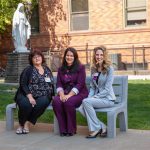Felicia Scrivens, an executive assistant at UPMC Shadyside, was 37 years old and didn’t normally give herself breast self-exams. As a working mom of three boys, the needs of her kids, family and community always came first.
“It was my very first time ever giving myself a breast self-examination,” Scrivens said. “I didn’t even know what to look for, what to feel for. When I felt it, I just knew that it didn’t belong there.”
Now, she’s more than a mother, friend and survivor — she’s also an advocate, working with UPMC to educate her community about breast cancer and early detection.
The Diagnosis
Breast cancer is the second most common type of cancer among women. However, the severity and type of breast cancer varies greatly by race and ethnicity.
“When we looked overall at breast cancer, what became glaringly apparent, unfortunately, is that what happens when African-American women have breast cancer is different from what happens in white women,” explained Dr. Steven Evans, surgical oncologist at UPMC Hillman Cancer Center. “We don’t have the answers or the science as to why that is exactly, we just know there are many factors.”
Black and African-American women under the age of 40 are more likely to be diagnosed with breast cancer than their white counterparts and are approximately 40% more likely to die from the illness.
Scrivens didn’t know any of this when she went in for a mammogram after finding the lump in her breast. She was told the lump could be cancer, but they couldn’t be sure until they did a biopsy.
About a week later, Scrivens received the phone call she had tried to brace for — she was diagnosed with an aggressive sub-type of breast cancer called triple negative breast cancer. This triple negative diagnosis makes up about 30% of all breast cancer diagnoses in Black and African-American women in the U.S.
Beating the Odds
UPMC has made it a priority to provide education and preventive care to Black and African-American women who may be at higher risk for breast cancer. When figuring out where to target efforts, UPMC conducted studies to determine the regions of Pennsylvania and New York most in need.
In the UPMC McKeesport Community Health Needs Assessment (CHNA), UPMC found the city of McKeesport had a high disparity when it came to preventive cancer screenings and women’s health services. The community is 54% women, and over 33% are Black and African-American.
However, providing the care to McKeesport area is more complex than simply encouraging women to make appointments. Social issues and relationships are just as important.
“The distrust in our community of the health care system is multi-factorial,” Evans said.
In addition, many women put their family’s health and needs before their own. “You have women who may be caring for their extended families,” Evans commented. “Often, they put themselves last.”
Once Scrivens knew she had triple negative breast cancer, she needed to do something about it.
After meeting with Evans, Scrivens began her treatment. The triple negative breast cancer required aggressive therapy: first, surgery at UPMC Shadyside, followed by chemotherapy and radiation at UPMC Hillman Cancer Center.
“Going through that experience made me want to give up,” she remembered. “I wouldn’t wish that on anyone.”
But Scrivens persevered, thanks to her children and her community. She became an expert on her cancer, and on her last day of treatment, she felt like a weight had been lifted off her shoulders
“I had radiation every day for six weeks,” Scrivens said. “That day when I stepped outside, I just took a sigh and cried. I told myself, ‘I did this. No more treatments. It’s time to live life, give back and advocate.’”
From Patient to Advocate
Evans and Scrivens stayed in touch throughout her treatment and after. Most recently, they became involved with programs at UPMC McKeesport, including the UPMC McKeesport Population Health Initiative and the Faith-Based Organization’s Call to Action, a program funded by the Frontline Innovation grant from The Beckwith Institute, to provide McKeesport’s Black and African-American community education about the risks of breast cancer and the positive outcomes of early detection.
Thanks to the care Scrivens received at UPMC, she has been cancer-free for 12 years.
“Hopefully my story can reach somebody in a similar situation who’s scared to know and may have a family history of breast cancer to get checked,” Scrivens said. “Early detection saves lives.”
UPMC McKeesport aims to promote preventive health and wellness throughout the community through various CHNA initiatives. Further information about CHNA efforts at UPMC McKeesport and other UPMC locations can be found on the UPMC website.









